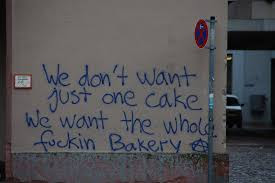Cooking the Books II: Cash mountains + We want the bakery
On the basis of figures released by the Office for National Statistics, the Times (9 April) reported:
‘Private companies, excluding financial institutions, have tucked away £173 billion since March 2016, the last full quarter before the referendum, and are sitting on £747 billion of cash, a level not seen before. At 35.3 per cent of GDP, the size of their pile of cash as a proportion of national output is at a historic high (…) In 2017, before the financial crisis, cash balances as a share of GDP were only 25 per cent. In 2000 they had been 20 per cent. They started to climb in 2012.’
This brings out how capitalist firms operate. A firm is an independent unit of capital seeking, through the actions of its top managers, to expand itself by making a profit and re-investing this in more productive capacity and production.
Cash mountains arise when the money profit acquired from selling the product is not immediately re-invested. This happens when the market for the product becomes saturated through overproduction, so that it is no longer profitable to produce them. In the particular case highlighted by the ONS figures, however, the reason seems to have been different.
Since the referendum, which went the wrong way as far as most of them are concerned, firms have been waiting to see what the post-Brexit profit-making conditions are likely to be. But the Brexit negotiations have dragged on and on. Profits are still being made from maintaining production at current levels but, in view of the uncertainty, they are not being re-invested in expanding production. Firms seem to have been marking time and as a result, have accumulated profits as cash.
The Times described this as ‘cash hoarding’ but this is not an entirely accurate description. It is not as if the cash is being stored in some safe. It is used to bring in an income as interest through buying stocks and shares and government bills and bonds, in effect by being lent.
Some critics of the present economic system describe it as a ‘debt-based economy’. This suggests that capitalism is driven by the pursuit of interest. Some have even absurdly suggested that capitalism has been kept going by loans to workers to buy things. Actually, capitalism is based on the pursuit of profits, of which interest is a sub-division. Some firms borrow money to invest in production for profit and, when they make a profit, share a part of this with the banks or other financial institutions that put up the money.
Those who talk of a ‘debt-based economy’ tend to think that banks create the money they lend by a few keyboard strokes. In fact, they can only lend what they have. The present ‘cash mountain’ is a reminder of where some of the what-banks-lend comes from – those who have lent them money either directly, or indirectly via the money market, including from firms that for one reason or another have built up cash mountains from uninvested profit.
We Want The Bakery

Our approach to the European elections was the same as our approach to national elections, which is that we would take our seats if elected, but we would use it as a platform or tribune to advocate solely for socialism.
The limited freedom of movement that the EU has afforded some workers is one of the few benefits of EU membership for ordinary people; but let’s also remember that the EU is preventing freedom of movement elsewhere, effectively drowning refugees in the Mediterranean. The question of who ‘we’ (i.e. capitalists) will find to exploit if EU workers are not here is not our concern as socialists representing the working class. We want a world without any exploitation.
What exists today is a limited political democracy (although elections are massively subverted by donations and vested interests). But there’s no economic democracy: we must all work for an employer who will exploit us, or we will starve. And no democracy in distribution – 8 men have as much wealth as half the world’s population. So we need a truly democratic society where ordinary people control production and distribution.
We are a party with a fully democratic structure that reflects the kind of society we want – no leader, run by members, no personality cult.
We have no intention of trying to reform capitalism, an approach that cannot work. We don’t advocate a mere ‘reorganisation of poverty’. We live right now in a society of potential abundance. Therefore we don’t need a system of rationing, which is all that a money system is. We need to unlock the wealth that is being kept from us and use it to transform society.
We don’t want crumbs, we want the bakery.
